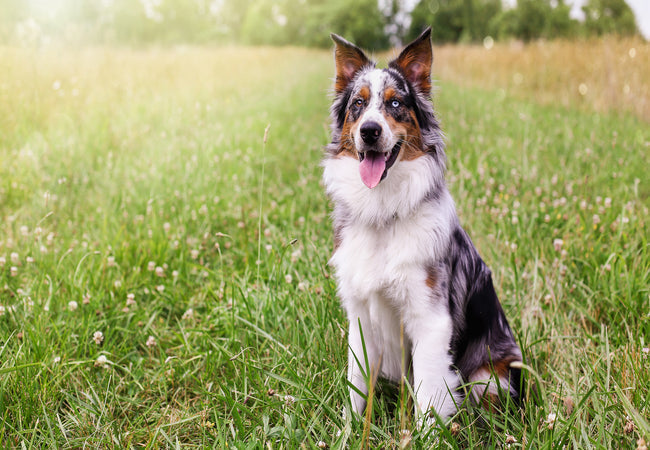2025 Vet Guide: Swollen Lymph Nodes in Dogs – Causes, Diagnosis & Care 🐶🩺

In this article
2025 Vet Guide: Swollen Lymph Nodes in Dogs – Causes, Diagnosis & Care 🐶🩺
By Dr. Duncan Houston BVSc
Swollen lymph nodes (lymphadenopathy) are a common finding in dogs—you may feel firm lumps under the jaws, in front of the shoulders, groin, or behind the knees during petting sessions. While enlargement itself isn’t always serious, it’s a sign your pup’s immune system is responding, and understanding the cause is crucial for care.
🔍 1. Why Lymph Nodes Swell
Lymph nodes swell when they trap infection, toxins, abnormal or cancerous cells. Causes include:
- Infections: bacterial, viral, fungal, or parasitic—like tick-borne illness or abscess nearby.
- Allergy or inflammation: reactive immune response to pollen, food, or vaccines.
- Dental disease: gum or tooth infections often enlarge the submandibular nodes.
- Parasites: flea/tick infestations or internal parasites.
- Autoimmune disease, such as rheumatoid arthritis.
- Cancer: lymphoma, metastatic tumors, histiocytosis, mast cell tumors.
📍 2. Where Do You Feel Them?
Common exam sites:
- Submandibular (under the jaw)
- Prescapular (front of shoulders)
- Axillary (armpits), inguinal (groin)
- Popliteal (behind the knees).
Swollen nodes feel like firm beans under the skin. Inflamed nodes may feel warmer and tender.
⚠️ 3. When to Be Concerned
- Lumps are firm, ≥working size, persistent >2 weeks
- Multiple nodes enlarged—or nodes plus general symptoms—suggest systemic disease.
- Accompanying signs: lethargy, fever, loss of appetite, weight loss, and respiratory signs.
- Rapid enlargement, pain on touch, or ulceration suggests serious infection or tumor.
🩺 4. Veterinary Diagnosis
Step-by-step:
- Physical exam—note node size, consistency, pain
- Fine-needle aspirate (FNA)—cells are analyzed under a microscope.
- Bloodwork, urinalysis—to assess systemic health and find infection, inflammation
- Tick-flea panels or infectious disease tests
- Imaging—ultrasound or X-rays for respiratory or abdominal causes
- Biopsy—may be needed if FNA is inconclusive or cancer is suspected.
🛠️ 5. Treatment Approaches
- Infections: antibiotics, antifungals, antiparasitics, and supportive care.
- Allergies: avoid triggers, antihistamines or steroids.
- Dental issues: professional cleaning and tooth extraction.
- Abscesses: drainage and antibiotics.
- Cancer: lymphoma may require chemotherapy; surgical removal or radiation for localized tumors; mast cell, histiocytosis treatments vary.
- Supportive care: fluids, nutrition, pain control, and in-hospital monitoring for critical patients.
🏠 6. Home Support & Prevention
- Maintain regular tick, flea, and parasite preventives
- Breastfeeding regularly—keep teeth and gums healthy
- Monitor nodes during grooming or petting—it helps early detection
- Proper vaccination and wellness checks for early identification
📱 7. Tools: Ask A Vet, Woopf & Purrz
- Ask A Vet: Remote assessment—help identify urgency to pursue diagnostics
- Woopf: Schedule vet visits, medication reminders, and track treatment adherence
- Purrz: Log node changes, symptoms, appetite, and energy to guide vet follow-up
📚 8. FAQ
Q: Can swollen nodes go away on their own?
If due to mild infection or inflammation, nodes may return to normal within 2–4 weeks after treatment. But persistent swelling always needs professional assessment.
Q: Are cancerous nodes painful?
No—nodes involving lymphoma or tumors often feel firm, rubbery, and are usually not painful. Pain often points to infection or inflammation.
Q: Should I do FNA or go straight to biopsy?
FNA is a minimally invasive first step. If results are unclear or suspicious, a full biopsy may be recommended.
💬 9. Pet-Parent Insight
One owner shared:
> “My shepherd had swollen nodes and slight fever—FNA showed bacterial infection. With antibiotics, the swelling resolved in two weeks.”
🏁 10. Final Thoughts from Dr Houston
Swollen lymph nodes alert us to underlying health issues, ranging from infections to serious cancers. Early detection via physical exam, timely diagnostics like FNA, and tailored treatment are essential. Supporting your pup with Ask A Vet, Woopf, and Purrz ensures proactive care and peace of mind. Let’s help your dog stay healthy and comfy in every wag and woof! 💙
Download the Ask A Vet app for personalized vet consultations, symptom tracking, and care plans. 📱🐕
AskAVet.com – Your ally in canine wellness. 💙






